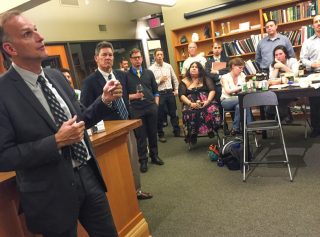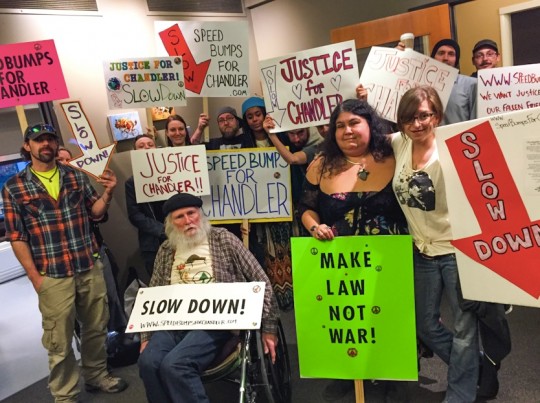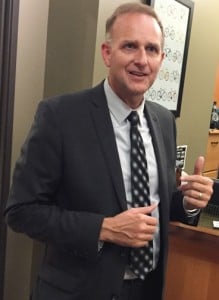
Chuck Sparks on his left) addressing last
night’s Wonk Night crowd.
(Photos © J. Maus/BikePortland)
We had two firsts at Wonk Night last night: An activist group used the event as a platform for their cause, showing up en masse with protest signs and demands; and an elected official announced a new legislative proposal that could someday change Oregon law.
It all started quite unexpectedly. As I set up the room for the event about 17 people walked in who I’d never seen before. They were carrying signs that said things like “Justice for Chandler!”, “Speed Bumps for Chandler!”, “Slow Down” and so on. It caught me off guard and it took me a few seconds to realize that the “Chandler” in their posters was Chris Chandler, the man who was killed last month on SE Stark.
Chandler’s death has sparked a grassroots effort by a group named Speed Bumps For Chandler who want the City of Portland to do more to keep people safe on streets outside after-hours music and entertainment venues. Turns out they heard several Multnomah County district attorneys would be at Wonk Night so they made the event part of an action alert on their website.
I met several people from the group, many of whom knew Chandler personally and are still experiencing the anguish from his death. Before getting the event started, I introduced the group’s unofficial leader, Alyssa Blum, and gave her the floor to describe why they came and what their group is working on.
“Our cause is the same as your cause,” she said. “We just want to to turn a senseless tragedy into a positive change.” Blum wants speed bumps on Stark and lower speed limits.
Later in the event, Blum and a few others from her group were able to connect with Families for Safe Streets founder Kristi Finney (who like Blum, was once an inexperienced activist thrust into her role by tragedy). They also shared their concerns directly with the four representatives from the Multnomah County District Attorney’s office who attended the event.
Speaking of which, the theme of this month’s Wonk Night was “The Negligence Gap.” We aimed to address the current gap in Oregon law that exists when someone is seriously injured or killed in a traffic collision. In these cases — Alistair Corkett’s case being just the most recent example — there are currently only two options: Either the DA must be able to prove that the vehicle operator deserves criminal charges which require a very high legal threshold of “recklessness” and “gross negligence”; or absent that criminal charge, the person can be issued a traffic citation.
Advertisement
To learn more about the issue we had the county’s most experienced district attorneys in the room with us: District Attorney Rod Underhill, Senior Deputy District Attorney Chuck Sparks, Deputy District Attorney Glen Banfield, and Deputy District Attorney/Legislative Liaison Jeff Rhoades.
“There’s such a vast gap between traffic citations and a felony. We find ourselves in collision with the law where we get handcuffed ourselves. We need more options.”
— Rod Underhill, Multnomah County DA
Underhill kicked things off by making an announcement. “I need all of your help for an idea we’re working on,” he shared. Underhill described the current situation. “There’s such a vast gap between traffic citations and a felony. We find ourselves in collision with the law where we get handcuffed ourselves. We need more options.”
About the Corkett case specifically, Underhill pointed out that if Corkett had died (he survived, but lost his right leg), the DA would have been able to pursue criminal negligence charges. But because he lived, the only option was to drop the case completely. The man who hit Corkett was given only a traffic citation. “It pissed me off. I’m angry,” Underhill said, “It just doesn’t seem right. We need to change the law.”
Not only was the driver of the motor vehicle in this case not held responsible for his actions to the extent the DA would have liked, but because he lived, Corkett cannot seek the restitution guaranteed in Article 1, Section 42 of the Oregon Constitution. That’s “inequitable” says Underhill.
Frustrated by this legal gap, the DA’s office has crafted a proposal that Underhill himself has already taken into meetings with key state legislators. So far he’s gotten support for it from both sides of the political aisle and he’s continuing to work the proposal in Salem.
During last night’s discussion people offered feedback and critiques of the proposal and asked questions about a wide range of related issues.
Bjorn Warloe, a citizen activist who helped pass the Vulnerable Roadway Users law in 2007, cautioned that new laws with punishments for behaviors that make a legislator think, “That could happen to me,” are hard to pass.
We also talked about how a law like this might get hung up by Oregon infamous urban/rural divide. If punishments result in loss of a driver’s license for instance, that’s a much bigger deal in a rural area (where driving a car is the only way to get around) than it is in Portland.
If the DA is able to pursue more criminal charges, that would also end up costing the state more money overall (in court and incarceration fees). It’s the dreaded “fiscal impact” that makes many new law proposals non-starters for some lawmakers.
To that point, Underhill said his office has estimated that there would likey only be a total of 15-16 cases each year in Oregon that would trigger the new law.
Speaking of incarceration, one man shared that he was concerned how a law that increased penalties for certain behaviors felt more like retribution and punishment, rather than a deterrent that would benefit society on the whole. “Is this whole idea just to make us feel good?” he questioned.
Any law that creates a new felony charge — especially one that would be targeted to people driving a motor vehicle — is sure to spur many important questions. It also won’t be an easy lift in Salem. But Underhill and his office are clearly committed to this effort. They’ve worked with this gap for too many years and they feel now’s the time to close it.
Last night’s discussion was the first of what I’m sure will be many more to come.
Stay tuned for more on this topic.
If you were at the event last night, please help complete this recap with your notes from the event and share thoughts about what you heard.
Wonk Night is supported by Lancaster Engineering with adult beverages provided by Widmer Brothers Brewing, Square Mile Cider, and Omission Beer.
— Jonathan Maus, (503) 706-8804 – jonathan@bikeportland.org




